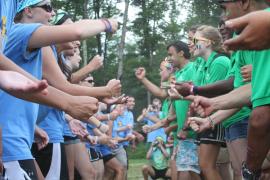One of the coolest parts of camp is the internal language — a unique dialect that only camp people understand. Cultivated over time, passed down through generations, and cemented into the fabric of camp, these words become the language of summer.
At the Jewish camp I attended in New Hampshire, many of the terms we used were a hybrid Hebrew-English slang; Marp Staff (nurses), Meltzers (waiters), Relish (Friday night singing), and many more. They are phrases only Camp Yavneh people know and have helped build tradition and a sense of belonging within our summer community for 80 years.
But when it comes to recruiting candidates from outside your camp network, using exclusive camp speak should be avoided. Camp terms are somewhat foreign to the outside world, and using insular camp phrases during the recruitment process can hinder your ability to hire. If applicants don’t understand the job being presented to them, they likely won’t apply for it.
As a recruitment partner to camps, my team recruits hundreds of candidates for open positions at camp each summer. To do that, we pay close attention to how applicants respond to the structure, language, and keywords we include in job descriptions. To maximize results and ensure our job postings reach our target audience, we study job performance data and often test different variations of job descriptions to see what yields the strongest results.
In this blog, we will share tips for how to create a comprehensive keyword strategy so you can get the most out of your recruitment efforts on job boards.
When It Comes to Job Titles, Keep It Simple
Before posting to a job board, it’s critical your job title adequately describes the role in candidate-facing terms. Here’s what we mean by that.
Many camps have creative and sometimes obscure naming conventions for roles. While widely accepted internally, unique job titles are often misunderstood by external job seekers. In today’s digital age, candidates search and apply for jobs at lightning speeds, often from their phones. To capture candidates in the current market, your job titles need to be easily recognizable and understood at a glance.
In order to appeal to candidates outside of your camp bubble, we recommend sticking to generic job titles that are familiar to job seekers. In practice, that means adjusting your internal job titles to more generic language before posting. A few common examples we often see (with suggested edits).
- Community Care Professional —> Social Worker
- Health Center Staff —> Registered Nurse
- Camp Administrator —> Office Manager
We recently put this theory to the test when partnering with a camp to hire a full-time general manager (the camp’s equivalent of a director). They had posted the job to major job boards with the general manager title and didn’t surface qualified applicants. Knowing the industry, we recommended they change their job title to executive camp director when marketing the job externally. The switch yielded a higher volume of qualified applicants almost instantaneously. Once they found their person, they switched the title back to general manager to align with their internal naming convention.
Focus on Keywords Candidates Care About
Once you’ve got your job title dialed in, it’s important to include the right mix of keywords in your job description to appeal to your target audience. The language you put into the body of your job posting will impact how your job performs in candidate search results, so it’s worth taking the time to get it right. Ideally, the words you include match the terms candidates are searching for. Lucky for us, Indeed has a free Analytics and Hiring Insights dashboard where employers can look up search trends by job and location. Before posting, use the tool to research popular search terms within a job category, then craft your job description accordingly to make sure you’ve covered your bases.
Using the counselor example below, most of the terms are common and likely already in your job description. But given that “summer jobs for college students” and “seasonal” are in the top five trends, adding those terms to your job description is certainly worthwhile. The more discoverable your posts are to your target audience, the higher engagement you’ll see.
Test, Monitor, and Adapt Based on Engagement
Whenever you post to job boards, you have to pay close attention to how candidates are engaging with your post. Are you getting enough views? Are you seeing a steady volume of candidates convert from clicks to applications? Are the applicants the right profile you’re seeking? There’s no perfect science to this method so it’s important to test, monitor, and adapt your post based on what you’re seeing. If a post isn’t gaining traction, play around with the job title and keywords until you see momentum.
We do this all the time when recruiting kitchen staff. We use head chef, executive chef, and kitchen manager interchangeably to see which one yields the best candidates. For counselors, we often post the same job with slightly different title variations and keywords. We rotate posts to keep them fresh and layer in more specific language around activities (sports, arts, etc.) to see what resonates. The trial-and-error process gives us valuable data on applicant engagement that informs our hiring strategy on job boards.
Use Keywords to Gain a Competitive Edge
Recruiting on popular job boards is highly competitive. To gain a leg up on your competition, focus on crafting job descriptions that align with search trends and resonate with your target audience. Researching keywords and iterating based on engagement will help you keep your post at the top of search results and give you the best shot at landing qualified candidates.
This blog was written on behalf of Project Real Job whose purpose is to support camps in their efforts to recruit, hire, and retain staff.
Aaron Lyon is the founder of CampHire, a recruitment firm that supports summer camps and nonprofits organizations. CampHire specializes in seasonal staff recruitment in the US and executive search for year-round leadership roles. Aaron leads CampHire’s recruitment operations, overseeing applicant sourcing, HR systems and platforms, and workflow automation. Aaron is an alumni of Camp Yavneh in NH and lives in Boston with his wife and three children.
Photo courtesy of Camp Wood YMCA in Elmdale, KS
The views and opinions expressed by contributors are their own and do not necessarily reflect the views of the American Camp Association or ACA employees.




